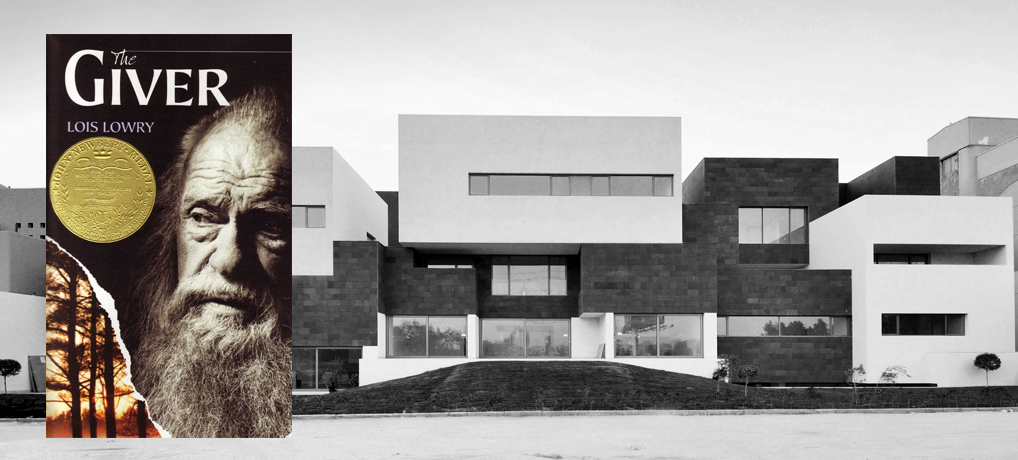 What do you think the world would be like if there was no love? Instead you would be bound to your family and spouse by a sense of obligation and responsibility. And everyone else around you was the same way. Your friendships would be shallow and your occupation would be decided by a committee instead of by following your passion or making up your own mind.
What do you think the world would be like if there was no love? Instead you would be bound to your family and spouse by a sense of obligation and responsibility. And everyone else around you was the same way. Your friendships would be shallow and your occupation would be decided by a committee instead of by following your passion or making up your own mind.
This is the world that award-winning author Lois Lowry gives us in her book The Giver.
It’s a perfect world. The weather is consistent year round. The community operates like a well-oiled machine and families are hand-picked to make sure the most optimal family units are matched up. Every day is like the last day and there is no starvation, disease or war.
There is also no room for things that we as a society today take for granted. There is no freedom to worship. No color. No love. No choice. In fact the only feelings that seem to still exist in this community are frustration, anxiety and shame. Society has traded these things for conformity and comfort.
Jonas is 12 years-old. His childhood is now over as he will be given his new life assignment and begin his training. He’ll never again count how many years in his life has passed and once he’s matured enough, he’ll be assigned a spouse and one day children to raise. It will be at a community ceremony that he’ll be given his assignment.
The ceremony is the beginning of Jonas’ enlightenment. Each child who is 12 years old goes up one by one, according to their order of birth, and receives their assignment. But when they get to 19, they skip Jonas and move on to number 20. After the rest of the children are given their assignments, the community leader calls Jonas up to the stage. In lieu of a normal community position, Jonas has been given the special assignment to become their new Receiver of Memories.
No one knows, but Jonas’ assignment could become the end of society as they know it. It seems that the Giver of Memories is holding all the memories from the past – both good and bad. Through receiving the memories from The Giver, Jonas begins to experience color, love, war and pain. He sees snow, hills and lakes. He gives one last drink to a dying boy in the trenches of war, experiences the joy of a sled ride and feels the warmth of love of the holidays. Eventually, Jonas is convinced that the rest of society needs to experience these things as well. How can just one person horde all these experiences from everyone?
 I love Lois Lowry’s descriptive language in this book. She literally has me seeing black and white. The gray tunics of the people, the uniform, monotone housing units, the institutional-like facilities that house the school, babies and the elderly. I can see the apple begin to glow red against the monotone background of everything else. I can see Fiona’s ginger locks and the pink tones of Gabriel’s chubby cheeks. Her ability to transport you into the world is amazing.
I love Lois Lowry’s descriptive language in this book. She literally has me seeing black and white. The gray tunics of the people, the uniform, monotone housing units, the institutional-like facilities that house the school, babies and the elderly. I can see the apple begin to glow red against the monotone background of everything else. I can see Fiona’s ginger locks and the pink tones of Gabriel’s chubby cheeks. Her ability to transport you into the world is amazing.
The story is also a very powerful theme. It’s a theme of defying authority. It’s a warning against the government taking over our lives and us letting our freedoms be removed from us methodically. Today we remove prayer from school and tomorrow another part of American history. Soon we’re stuck learning math, language and science only just like Jonas’ “perfect” community. It shows that choice should never be removed no matter how much chaos bad decisions cause the rest of us. Our society is not perfect. There’s starvation, neglect, abuse and anger running rampant. But there’s also love, charity, creativity and freedom. I wouldn’t trade those things for anything.
I first read this book when I was in Middle School. It’s been a story that I have never forgotten. I even bought the Spanish-language version when I was learning Spanish because I loved the story so much. My favorite part is that you don’t really know how the story ends. Lowry lets us make the choice – which is the whole purpose of this story. This classic piece of literature gets 5 stars from me for sure and I’m happy to say it’s required reading in most high schools across the US, making sure that it will live on for generations.
What books from your childhood do you want to re-read now that you’re an adult?

